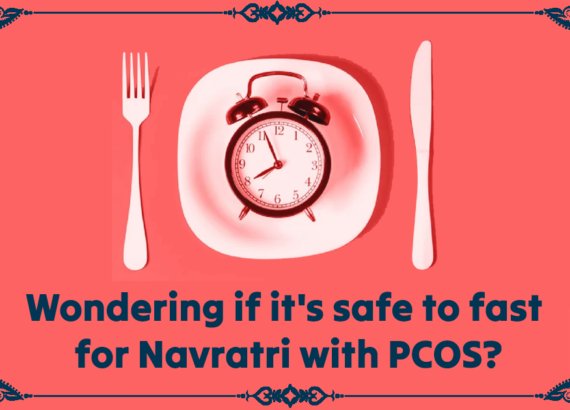PCOS Weight Gain Solution: How to Deal with PCOS & PCOD-Related Weight Gain

Tips and Tricks for Managing PCOD-Related Weight Gain
Can weight gain be managed in PCOD? How can you take control of your weight and your health? In this article, we will provide you with valuable tips and tricks that have been proven to work for women with PCOS. Whether you’re new to PCOS or have been struggling with it, this guide will empower you with the information and resources you need to achieve your weight loss goals and feel your best and we’ll cover some of the most effective strategies for managing PCOD-related weight gain, from exercise to diet to self-care.
Self-care is not selfish. You cannot serve from an empty vessel.
Understanding PCOD and Weight Gain
PCOS is a common hormonal disorder that affects millions of women worldwide. It leads to weight gain, which can be difficult to manage. Women with PCOS often find it hard to shed pounds, despite their best efforts. This condition can have a significant impact on their self-esteem and overall health. However, with the right strategies, managing PCOD-related weight gain is possible.
Why does PCOD cause Weight Gain?
PCOS affects the ovaries and causes hormonal imbalances, leading to weight gain. Women with PCOS are more prone to gaining weight than those without the condition. PCOS can cause weight gain due to factors such as insulin resistance and hormonal imbalances. Insulin resistance makes it harder for the body to use insulin effectively, resulting in high blood sugar levels and weight gain. Hormonal imbalances can also affect metabolism and calorie burning. Additionally, PCOS can lead to abdominal fat storage, which increases the risk of heart disease and other health problems.
The Impact of PCOD on Metabolism
PCOS can significantly slow down metabolism, which is the process of converting food into energy. With PCOS, your metabolism may not burn calories as efficiently, making weight loss more challenging even with a healthy diet and exercise routine. PCOS can also affect how your body processes carbohydrates. It may hinder the effective processing of glucose, leading to high blood sugar levels and weight gain. Moreover, PCOS can alter fat storage, causing fat to accumulate in the abdominal area, which is associated with an increased risk of health problems.
The importance of a balanced or healthy diet for managing PCOD-related weight gain
To manage PCOD-related weight gain, maintaining a balanced diet is crucial. A balanced diet includes a variety of foods from different groups: fruits, vegetables, whole grains, lean proteins, and healthy fats. A balanced diet helps you maintain a healthy weight, reduce the risk of other health issues like diabetes and heart disease, and manage PCOS symptoms such as insulin resistance and high blood sugar levels.
Avoid processed foods and sugary snacks, which can cause spikes in insulin levels and lead to weight gain. And don’t forget to stay hydrated – aim for at least 8 glasses of water a day.
What foods should you eat and avoid when managing PCOD-related weight gain?
When you have PCOS, it’s important to pay attention to your food choices. Some foods can help manage symptoms and maintain a healthy weight, while others can worsen symptoms and contribute to weight gain.
Foods to Eat:
- Fruits and vegetables: These fiber-rich, vitamin-packed foods promote satiety.
- Whole grains: Complex carbohydrates in whole grains regulate blood sugar levels and keep you full.
- Lean proteins: Chicken, fish, tofu, and beans provide satiety.
- Healthy fats: Nuts, seeds, avocados, and olive oil help you feel satisfied.
Foods to Avoid:
- Sugary foods: These cause blood sugar spikes and weight gain.
- Processed foods: They are calorie-dense, often high in unhealthy fats and added sugars, contributing to weight gain.
- High-fat foods: These are hard to digest and can lead to weight gain.
- Dairy products: Some women with PCOS experience insulin resistance and weight gain due to dairy consumption.
The Role of Exercise in Managing PCOD-related Weight Gain
Exercise plays a crucial role in managing PCOD-related weight gain. Regular exercise helps burn calories, maintain a healthy weight, and reduce the risk of other health problems like heart disease and diabetes. When you have PCOS, it’s essential to find an exercise routine that suits you. High-intensity exercises like running or weightlifting may not be suitable for everyone with PCOS. Low-impact exercises like yoga or swimming can be beneficial alternatives. You don’t have to go to a gym to get enough exercise. Instead, try incorporating physical activity into your daily routine. This could include taking a walk after dinner, doing yoga in the morning, or joining a sports team.
Even if you’re feeling tired or unmotivated, try to get moving every day. Start with something small, like a few minutes of stretching or a short walk around the block. Over time, you can build up to longer workouts and more intense activities.
Remember, the only bad workout is the one that didn’t happen – so even if you’re not feeling your best, try to do something.
What are the Best Exercise Routines for PCOD Patients?
Several types of exercises are particularly beneficial for women with PCOS, including:
- Cardiovascular exercises : Walking, jogging, cycling, and swimming help burn calories and improve cardiovascular health.
- Strength training : Weightlifting and resistance training build muscle mass and improve metabolism.
- Yoga : Reduces stress while improving flexibility and balance.
When starting an exercise routine, it’s important to begin slowly and gradually increase intensity and duration. This approach helps avoid injuries and ensures maximum benefits.
To learn about the most effective exercises for PCOS weight loss at home, please read our comprehensive article.
Lifestyle Changes to Manage PCOD-related Weight Gain
In addition to diet and exercise, several lifestyle changes can help manage PCOD-related weight gain:
- Sufficient sleep : Sleep is vital for regulating metabolism and hormones, so ensure you get enough sleep each night.
- Stress management : Find ways to manage stress through activities like yoga, meditation, or deep breathing exercises, as stress can contribute to weight gain.
- Quit smoking : Smoking can contribute to insulin resistance and weight gain, so quitting is crucial.
- Limit alcohol consumption : Alcohol can contribute to weight gain and other health problems, so it’s important to drink in moderation.
Supplements and Medications to Manage PCOD-related Weight Gain
Certain supplements and medications may help manage PCOD-related weight gain. These include:
- Metformin : This medication, commonly used to treat diabetes, may also help women with PCOS manage symptoms, including weight gain.
- Inositol : A supplement that may improve insulin sensitivity and regulate menstrual cycles in women with PCOS.
- Omega-3 fatty acids: Healthy fats that may reduce inflammation and improve insulin sensitivity in women with PCOS.
- Hermones : In addition to the above mentioned supplements and medications, there is a natural nutraceutical supplement called Hermones that can help correct hormonal imbalances and support healthy weight management in women with PCOD/PCOS.
Coping with Emotional Stress related to PCOD and Weight Gain
PCOS can be challenging to manage, and weight gain can cause emotional distress. It’s important to take care of your emotional well-being alongside your physical health. Seek support from family, friends, or a mental health professional. Practice self-care through activities like meditation, yoga, or other relaxation techniques.
The Importance of a Positive Mindset
First and foremost, it’s important to approach weight loss with a positive mindset. Remember that progress is progress, no matter how small. Even if you’re not seeing immediate results, every healthy choice you make is a step in the right direction. So don’t get discouraged – keep pushing forward, one step at a time. And don’t forget to celebrate your victories along the way, no matter how small they may seem.
Focus on Progress, Not Perfection
It’s easy to get caught up in perfectionism when it comes to weight loss. We want to see results fast, and we want them to be perfect. But the truth is, progress is more important than perfection. Even small changes can add up to big results over time. So don’t beat yourself up if you slip up or don’t see immediate progress. Celebrate the small victories, like making a healthy meal or going for a walk instead of watching TV. Every healthy choice you make is a step in the right direction.
Make Small Changes for Big Results
When it comes to managing PCOS-related weight gain, small changes can make a big difference. Start by making one healthy choice a day – maybe it’s swapping out a sugary snack for a piece of fruit, or taking the stairs instead of the elevator. Over time, these small changes will become habits, and you’ll be well on your way to a healthier, happier you. Remember, every healthy choice you make is a step in the right direction.
Take Care of Yourself
Taking care of yourself is essential for managing PCOS symptoms and promoting weight loss. Whether it’s through yoga, meditation, or spending time in nature, make sure to prioritize self-care every day. And don’t feel guilty for taking time for yourself – you deserve it. Remember, you cannot pour from an empty cup – taking care of yourself allows you to better serve others and live your best life.
Manage Stress
Stress is a major factor in weight gain, especially for women with PCOS or PCOD. High levels of stress can increase cortisol levels in the body, which can cause weight gain, especially around the midsection.
To manage stress, try incorporating relaxation techniques into your daily routine, such as meditation, deep breathing exercises, or yoga. You may also want to consider seeking counseling or therapy if you’re struggling to manage your stress levels.
Conclusion
In conclusion, managing PCOS-related weight gain is possible with the right mindset and tools. Remember to approach weight loss with a positive attitude, focus on progress rather than perfection, and make small changes for big results. Exercise regularly, prioritize self-care, and focus on eating a healthy, balanced diet. With these strategies in your arsenal, you can achieve your weight loss goals and feel confident in your own skin.
FAQs
Q: Can PCOS cause weight gain?
A: Yes, PCOS and PCOD can cause weight gain, especially around the midsection.
Q: What is the best diet for PCOS weight loss?
A: A healthy, balanced diet that’s low in sugar, processed foods, and refined carbohydrates is the best diet for PCOS weight loss.
Q: Is exercise important for PCOS weight loss?
A: Yes, regular exercise is important for PCOS weight loss. Exercise can help you burn calories, build muscle, and reduce stress.





